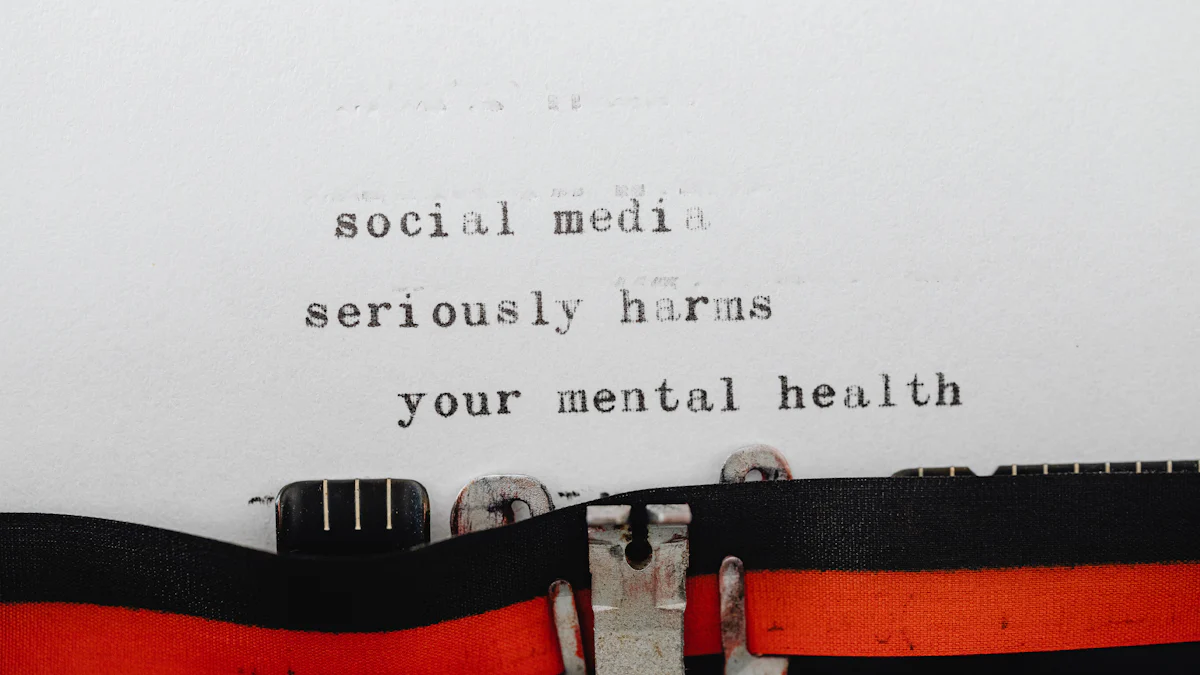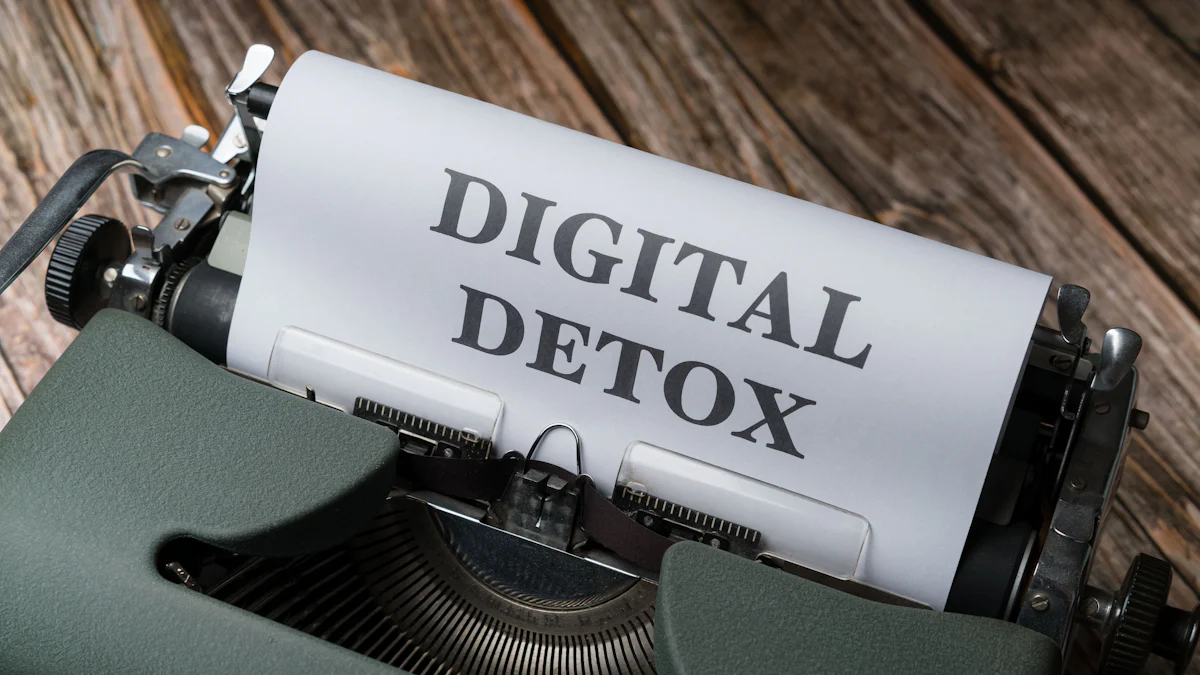10 Steps to a Successful Digital Detox for Mental Health

A digital detox involves taking a break from digital devices to improve mental health. Mental health remains crucial for overall well-being. Excessive use of digital devices harms mental health. 54% of U.S. teens say they spend too much time on their cellphones. 78% of teens check their devices hourly. These habits lead to increased rates of depression and anxiety. Implementing digital detox strategies for mental well-being can help regain control over life. Start the journey to a healthier mind by following practical steps.
Understanding the Need for a Digital Detox

The Impact of Digital Overload on Mental Health
Stress and Anxiety
Heavy usage of digital devices can increase stress and anxiety. Constant notifications and messages create a sense of urgency. This urgency leads to heightened stress levels. Studies show that digital overload can cause anxiety. The brain struggles to process the constant influx of information. This struggle results in mental fatigue and heightened stress.
Sleep Disruption
Digital devices can disrupt sleep patterns. The blue light from screens interferes with melatonin production. Melatonin regulates the sleep-wake cycle. Reduced melatonin makes falling asleep difficult. Poor sleep quality affects mental health. Research indicates that heavy device usage before bed worsens sleep quality. This disruption leads to increased stress and decreased well-being.
Reduced Productivity
Constant digital distractions reduce productivity. Notifications and alerts break focus. Frequent interruptions make task completion harder. Studies reveal that digital overload decreases productivity. The brain needs time to refocus after each interruption. This constant refocusing drains mental energy. Reduced productivity leads to frustration and stress.
Recognizing the Signs of Digital Addiction
Constant Checking of Devices
Frequent device checking indicates digital addiction. Many people feel compelled to check their phones constantly. This compulsion disrupts daily activities. Studies show that constant device checking increases stress. The brain craves the dopamine rush from notifications. This craving leads to addictive behavior.
Feeling Anxious Without Devices
Anxiety without devices signals digital addiction. Many people feel uneasy when separated from their phones. This unease indicates dependency. Research shows that digital addiction causes anxiety. The fear of missing out (FOMO) drives this anxiety. People worry about missing important updates or messages.
Neglecting Real-life Interactions
Neglecting real-life interactions signifies digital addiction. Many people prioritize screen time over face-to-face conversations. This prioritization harms relationships. Studies reveal that digital addiction reduces social engagement. People become isolated and disconnected. This isolation negatively impacts mental health.
Preparing for Your Digital Detox
Setting Clear Goals
Identifying Personal Reasons
Start by understanding why a digital detox is necessary. Reflect on how digital devices impact daily life. Consider stress levels, sleep quality, and productivity. Identify personal reasons for wanting a break from screens. Personal motivations will drive commitment to the detox process.
Defining Success
Define what success looks like for the digital detox. Set specific, measurable goals. For example, aim to reduce screen time by two hours daily. Establish clear milestones to track progress. Success might include improved sleep, reduced stress, or more face-to-face interactions. Clear goals provide direction and motivation.
Informing Friends and Family
Gaining Support
Share digital detox plans with friends and family. Explain the reasons behind the decision. Seek their support and understanding. Loved ones can offer encouragement and hold you accountable. Support from others increases the likelihood of success.
Setting Boundaries
Set boundaries to protect the digital detox journey. Inform friends and family about tech-free times. Request that they respect these boundaries. For instance, avoid phone calls during meals or late at night. Clear boundaries help maintain focus and reduce digital distractions.
"In these 6 months of digital detoxing, I’ve learned quite a lot of things about myself and how my brain works." - Anastasia
Digital detox strategies for mental well-being require planning and support. Setting clear goals and informing loved ones are crucial steps. These actions create a strong foundation for a successful digital detox.
Digital Detox Strategies for Mental Well-being

Step 1: Start with Small Changes
Limiting Social Media Time
Begin by reducing social media usage. Set specific time limits for daily use. Use app timers to enforce these limits. Gradually decrease the time spent on social platforms. Studies show that university students who detoxed from social media experienced better mood states and less anxiety. Improved mental health can result from reduced social media engagement.
Turning Off Notifications
Turn off notifications to minimize distractions. Disable alerts for non-essential apps. Constant notifications create a sense of urgency and stress. Reducing these interruptions helps maintain focus. People who refrain from engaging with social media often report improved well-being. Enjoy the peace that comes with fewer digital disruptions.
Step 2: Create Tech-Free Zones
No Devices in the Bedroom
Establish the bedroom as a tech-free zone. Remove all digital devices from this space. The absence of screens promotes better sleep quality. Blue light from screens interferes with melatonin production. University students who avoided digital devices before bed reported better sleep. Improved sleep enhances overall mental health.
Tech-Free Mealtimes
Implement tech-free mealtimes to foster real-life interactions. Keep phones and tablets away during meals. Engage in meaningful conversations with family and friends. Prioritizing face-to-face interactions strengthens relationships. Neglecting real-life interactions can harm mental health. Enjoy the benefits of connecting with loved ones without digital distractions.
Step 3: Schedule Digital Downtime
Daily Breaks
Incorporate daily breaks from digital devices. Allocate specific times each day for tech-free activities. Use these breaks to engage in offline hobbies or physical exercise. Regular breaks reduce mental fatigue and improve focus. Self-initiated periods of abstinence from digital devices lead to better mood states and less anxiety.
Weekend Detoxes
Plan weekend detoxes to disconnect from technology. Spend weekends engaging in outdoor activities or exploring new hobbies. Extended breaks from digital devices provide a mental reset. People who practice regular digital detoxes report enhanced well-being. Embrace the joy of missing out on digital distractions.
Step 4: Engage in Offline Activities
Physical Exercise
Engage in physical exercise to boost mental health. Physical activity releases endorphins, which improve mood. Regular exercise reduces stress and anxiety. Choose activities that you enjoy. Try running, swimming, or yoga. Consistent exercise routines enhance overall well-being. University students who detoxed from social media experienced better mood states and less anxiety. Physical exercise contributes significantly to these improvements.
Hobbies and Interests
Pursue hobbies and interests to enrich life. Engaging in offline activities provides a mental break from screens. Explore creative outlets like painting, writing, or gardening. Hobbies offer a sense of accomplishment and joy. People who engage in offline activities report improved mental health. Discover new passions and reconnect with old ones. Hobbies foster a balanced and fulfilling life.
Step 5: Practice Mindfulness
Meditation
Practice meditation to cultivate mindfulness. Meditation helps calm the mind and reduce stress. Set aside time each day for meditation. Focus on your breath and let go of distractions. Studies show that meditation improves mental clarity and emotional stability. Regular practice enhances overall mental health. Embrace the peace that comes with a quiet mind.
Deep Breathing Exercises
Incorporate deep breathing exercises into your routine. Deep breathing reduces anxiety and promotes relaxation. Take slow, deep breaths to calm the nervous system. Practice deep breathing during stressful moments. This simple technique can be done anywhere. People who practice deep breathing report lower stress levels. Use this tool to maintain mental well-being.
Step 6: Reconnect with Nature
Outdoor Walks
Take outdoor walks to reconnect with nature. Walking in natural settings reduces stress and boosts mood. Spend time in parks, forests, or by the water. The fresh air and natural beauty provide a mental reset. University students who spent time outdoors reported better sleep and reduced anxiety. Make outdoor walks a regular part of your routine.
Nature Trips
Plan nature trips to escape digital distractions. Weekend getaways to natural locations offer a complete break from technology. Explore hiking trails, campgrounds, or beaches. Immersing yourself in nature enhances mental well-being. People who take nature trips experience improved mood and reduced stress. Embrace the tranquility and beauty of the natural world.
Step 7: Reflect on Your Progress
Journaling
Start a journal to document your digital detox journey. Write about daily experiences and feelings. Reflect on changes in mood, stress levels, and sleep quality. Journaling helps track progress and identify patterns. University students who kept journals during social media detoxes reported better mood states and less anxiety. A journal provides a tangible record of your achievements.
Self-assessment
Conduct regular self-assessments to evaluate your progress. Ask yourself questions about your mental well-being. Consider how reduced screen time impacts stress and productivity. Self-assessments help you stay mindful of your goals. People who engage in self-reflection often experience improved mental health. Use self-assessment as a tool for continuous improvement.
Step 8: Seek Professional Help if Needed
Therapy
Consider therapy if you struggle with digital addiction. Therapists offer strategies to manage screen time effectively. Therapy provides support for underlying mental health issues. Many people find therapy beneficial during a digital detox. Professional guidance can make the process smoother and more effective.
Support Groups
Join support groups for additional encouragement. Support groups connect you with others facing similar challenges. Sharing experiences fosters a sense of community and accountability. Many people benefit from the collective wisdom of support groups. These groups offer practical advice and emotional support.
Step 9: Maintain a Balanced Digital Diet
Conscious Consumption
Practice conscious consumption of digital content. Choose quality over quantity when engaging with digital media. Limit exposure to negative or stressful content. Conscious consumption promotes a healthier relationship with technology. People who practice mindful digital habits report better mental well-being.
Regular Digital Detoxes
Incorporate regular digital detoxes into your routine. Schedule periodic breaks from digital devices. Use these breaks to recharge and reconnect with offline activities. Regular detoxes help maintain a balanced digital diet. Many people find that frequent detoxes enhance overall mental health. Embrace the benefits of a balanced approach to technology use.
Step 10: Celebrate Your Success
Reward Yourself
Take a moment to recognize your achievements in your digital detox journey. Rewards can motivate you to maintain healthy habits. Choose something meaningful as a reward. Treat yourself to a favorite meal or a new book. Enjoy a day out doing an activity you love. Celebrating milestones boosts your morale and reinforces positive behavior.
Share Your Journey
Sharing your digital detox journey can inspire others. Talk about your experiences with friends and family. Use social media to share your progress and insights. Write a blog post or create a video about your journey. Sharing helps you reflect on your achievements and encourages others to start their own digital detox. People who share their stories often feel a sense of accomplishment and community.
"University students who underwent social media detoxes showed better mood states, less anxiety, and better sleep during and after the detox process."
Celebrate your success by acknowledging your hard work and dedication. Rewards and sharing your journey can make the experience even more fulfilling. Embrace the positive changes and continue to prioritize your mental well-being.
A digital detox plays a crucial role in improving mental health. Taking breaks from digital devices can reduce stress and anxiety. Starting your own digital detox journey can lead to a healthier mind. Long-term benefits include better sleep, enhanced productivity, and stronger real-life connections. Embrace the opportunity to regain control over your life. Celebrate each milestone and enjoy the positive changes. Remember, a balanced digital life promotes overall well-being.
See Also
Key Meditations for a Relaxing Getaway
Effective Stress Management through Relaxing Steps
Best Ways to Unwind and De-stress Naturally in 2024

